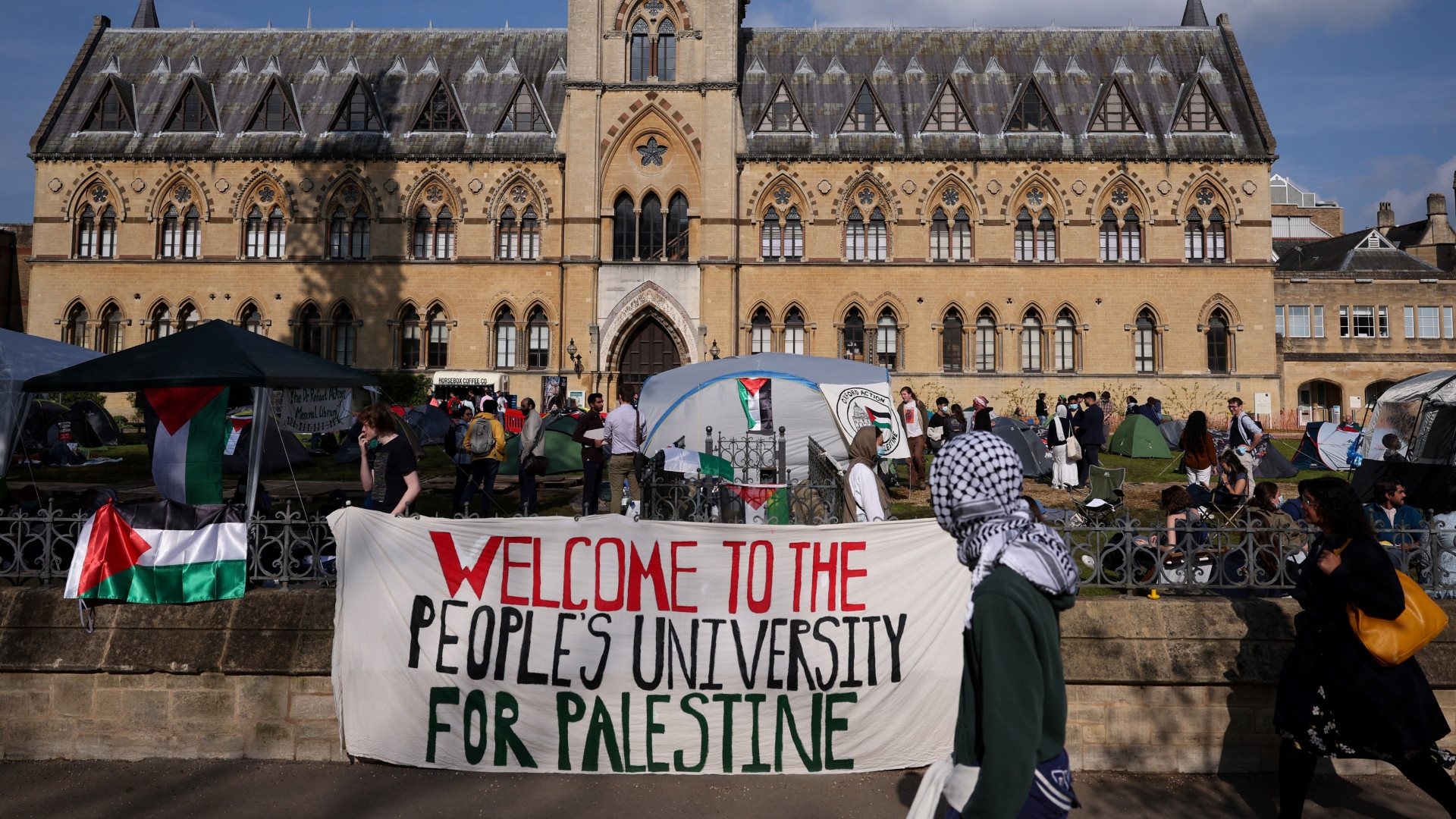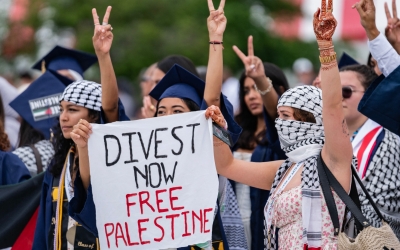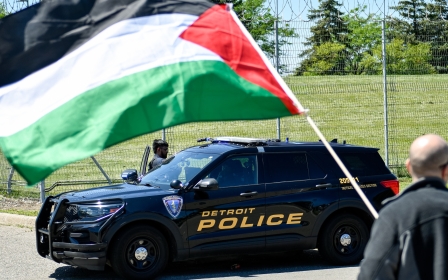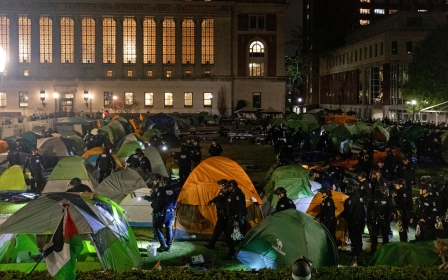War on Gaza: Why are UK universities inviting police to curb student protests?

Last May, student groups all over the UK created encampments to pressure their institutions to end ties with and divest from arms manufacturers and companies complicit in Israel's apartheid regime and genocide.
Following more than a month of pro-Palestine student encampments on UK university campuses, police crackdowns and mass arrests of student activists have become widespread.
On 3 June, at least 17 people who were protesting against Israel's massacre of the Rafah tent camp last month were arrested in Cardiff, Wales. Among them was a leading activist with a disability who was conducting a "sit down" protest.
In response, more than 100 supporters gathered at Cardiff Bay police station to demand his release.
Disturbing video footage, backed by witness accounts, revealed people being dragged by their arms and hair, tugged at and pulled violently by the police.
New MEE newsletter: Jerusalem Dispatch
Sign up to get the latest insights and analysis on Israel-Palestine, alongside Turkey Unpacked and other MEE newsletters
In one instance, a 22-year-old student from Cardiff University recalls the apparent "racial profiling" against a Muslim hijabi woman who was arrested despite not being with the protesters.
In Swansea, police raided the house of a 12-year-old Palestinian girl and her mother, arresting them both in the early morning of 4 June. Following these distressing incidents, the organisers released a statement reprimanding the South Wales police for blatant abuse, racism and intolerance of peaceful protesters.
In response to the allegations, a spokesperson from the South Wales police and the police superintendent both denied any wrongdoing by police, including discrimination and the use of violence against protesters.
Violent suppression
At Newcastle University, students faced violent suppression from university leaders, who authorised over 140 police officers to crack down on students. Witness accounts revealed that students were assaulted with batons and harassed during forceful confrontation with the police.
Despite the lack of engagement, threats and suppression from institutions, students remain steadfast in their pursuit of justice for Gaza
The university administration threatened the encampment with eviction notes, and even cut off water, electricity and access to toilets in an attempt to intimidate the students rather than hold negotiations about the institution's complicity in Israel's genocidal war on Gaza.
A spokesperson from Newcastle University told Middle East Eye: "Our security team dealt with the situation with the assistance of Northumbria Police who were present because of the planned protest by those who were neither staff nor students. Police made their own assessment of the situation and responded accordingly."
They added: "No students have formally reported injuries to us, and we have provided protesters with information on how to make an official complaint to Northumbria Police."
However, a medical student at Newcastle told the UK-based advocacy organisation CAGE International: "Students who had been encamping on their campus for nearly 30 days peacefully, whose demands were communicated to the university for months via student and staff petitions, protests, walkouts, union and student representatives, were ignored and instead were met with a brutal police response."
A spokesperson from Northumbria Police has also denied all allegations regarding its policing of a protest on 29 May, claiming that "a number of protesters outside the building refused to comply with police instructions and seemed intent on gaining entry".
In contrast, pro-Israel protesters, who have been harassing peaceful encampments as seen at Queen Mary University or at University College London (UCL) and London's Soas university, did not face the same police crackdown or forceful confrontation.
At Nottingham University, the staff have refused to discuss the students' demands. Instead, they are taking them to court in an attempt to evict them from their encampment.
Students had less than two days' notice to attend the initial court proceeding and had no legal representation. Now they are raising money for their defence, which will cost between £15,000 ($19,000) and £17,000. Nottingham University did not reply to MEE's request for a response.
Similar court proceedings are happening at the University of Birmingham to intimidate students and evade accountability
Complicity in war crimes
These disturbing events have shown us that British universities would prefer to continue lending a hand to the illegal Israeli occupation and be complicit in war crimes than facilitate an honest, open dialogue to address students' grievances.
It is concerning that higher education institutions that are supposed to be "independent bodies" are seemingly influenced by the UK government's foreign policy and cabinet, which have implicated themselves in violations of international humanitarian law over the past year.
The beneficiaries, ie students at these universities, have a right to criticise where their tuition fees are being spent, exercise their civil liberties and protest over grave human rights abuses.
The British public must stand in solidarity with the brave students who are mobilising to end Israel's crimes in Palestine, including the murder of at least 37,202 Palestinians, obliterating all educational buildings and creating a grave humanitarian crisis.
While the mainstream media continues to downplay Israeli aggression and be a mouthpiece for UK leaders who have endorsed and enabled the genocide since 7 October, civil society groups are working to amplify the efforts of the student protesters.
Courage and success
Despite the lack of engagement, threats and suppression from institutions, students remain steadfast in their pursuit of justice for Gaza.
The perseverance and resilience of the people of Gaza have ignited a spirit in activists globally to honour their sacrifices and demand justice
On 7 June, students at Swansea University successfully got their university to divest £5m from Barclays, which invests in arms and weapons that kill Palestinians. They also got their university to commit to supporting Palestinian student scholarships and protecting the right to political speech on campus.
Similarly, other universities have ramped up their escalation tactics to get administrators at the table and have meaningful dialogue about their demands. The perseverance and resilience of the people of Gaza have ignited a spirit in activists globally to honour their sacrifices and demand justice.
One such example is the establishment of the Muslim Students for Palestine, a solidarity network that was mobilised in the wake of the encampments to support and amplify students' pro-Palestine activism on campus.
The views expressed in this article belong to the author and do not necessarily reflect the editorial policy of Middle East Eye.
Middle East Eye delivers independent and unrivalled coverage and analysis of the Middle East, North Africa and beyond. To learn more about republishing this content and the associated fees, please fill out this form. More about MEE can be found here.






